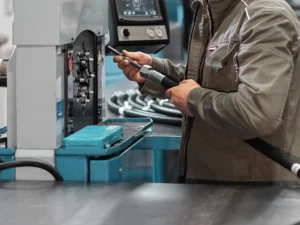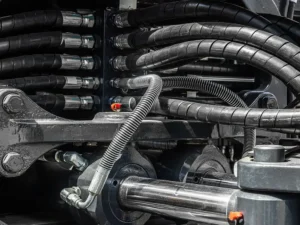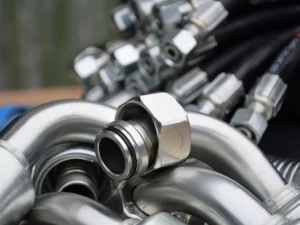Are you looking for a custom hydraulic hose assembly or want to learn more about it? Then you are in the right place.
Regular hydraulic hose sizes do not always fit every setting. You might already have faced this situation. Custom hydraulic hose assemblies help a lot here. Rentone Hose allows you to customize the hydraulic hoses based on your project needs.
Recently, people have heavily depended on hydraulic systems. These systems are prevalent in many uses because they produce high power from low power input. Before, people used hydraulic systems only for lifting purposes. But now, they are widely used in machines, equipment, and even cars or motorcycles.
Many customers face challenges when selecting custom hydraulic hose assemblies. They generally need more information to make the right decision.
This article is all about custom hydraulic hose assemblies. It mainly highlights the things that you must consider before making the decision. In addition, you will be familiar with the assembly processes in rubber hose factories.
What is a Custom Hydraulic Hose Assembly?
“Custom” means customization or changes in the hose products. So, custom hydraulic hoses are tailored for specific uses. The design and creation process is called custom hydraulic hose assembly.
This assembly process follows some sequential steps. First, you can choose the materials, fittings, and hose size. Once the design process is complete, cutting and assembly preparation begins. Then, the actual assembly and crimping are performed. Finally, after testing the products, they are delivered to the customer. You will briefly learn about it in the later sections.
Custom hydraulic hoses are the best choice when your system is unique or difficult to assemble. In contrast, standard sizes are a better value for money for simpler setups. However, the main reason for making custom sizes is to ensure they fit perfectly, which is essential for getting the best results.
Benefits of Custom Hydraulic Hose Assembly
There are several reasons why the demand for a custom hydraulic hose is high. Some of the key benefits are:
(1) A custom hydraulic hose is meant to fit perfectly with a system. Because of this, you can reduce the risk of leaks or failures.
(2) Using a custom hydraulic hose is also very helpful because it improves efficiency. To help you understand, let’s take an example. Suppose you bought a hydraulic hose with an inner diameter of 8.5mm. But your system needs 8mm, and you can’t get an 8 mm inner diameter hose on the market. In this case, you must either use an adaptor or change the fittings on the hydraulic system, which might be troublesome. Both ways may create safety risks.
(3) Incorrect fitting or bending in a system raises safety risks. A unique hydraulic hose can significantly reduce these risks.
(4) Custom hydraulic hoses have a high initial cost. However, they reduce the need for replacement and maintenance in the long run, ultimately saving operating costs.
(5) Customization gives you flexibility in hydraulic system design. You can assemble your hydraulic components at your convenience.

Application of Custom Hydraulic Hose Assembly
Where there is a need for a hydraulic system, there is a need for a custom hydraulic hose assembly. In construction, hundreds of heavy machines need these special hydraulic hoses and fittings. Some examples are excavators, bulldozers, drill rigs, and dump trucks.
You might know about tractors and harvesters used in farming. They also use hydraulic systems to control lifting and harvesting.
Running every tool using electricity costs a lot in manufacturing. The setup for these systems increases safety risks over time. That’s why experts came up with a much better solution. The use of hydraulic and pneumatic tools saves money and makes things safer.
Many cars or motorcycles also use custom hydraulic hoses. They are primarily used in the engine, steering, and brake systems. The accurate fluid transfer ensures perfect vehicle control. People buy new models every month or year, so the demand for custom hydraulic hoses is vast in this market.
Hydraulic systems play a significant role in aircraft landing gear, brakes, and control. Ships in Marin also use hydraulic systems for many different tasks.
Things You Should Consider Before Ordering Custom-Made Hydraulic Hoses
As always, there are a few things to consider when buying custom hydraulic hoses. This information can help you find the best product for your needs.
Material Selection
The material used to make hydraulic hoses directly affects their performance. Rubber, plastic, and metal are usually used. You may already know about these. Still, we need to check some of their hydraulic features.
Hydraulic rubber hoses are the most widely used material. In this case, people prefer synthetic rubber. More specifically, nitrile is the most prevalent one. This material is durable, easy to get, and good against chemicals.
Thermoplastic hoses are known for being lightweight and chemical-resistant. These hydraulic hoses are mainly used for vehicles and work best in harsh chemicals.
On the other hand, metal is less common but is widely used in factories. It offers excellent durability but is not as flexible as rubber or thermoplastic.
Types of Hydraulic Hoses
Hydraulic hoses may have different types besides materials. You should also be familiar with them before ordering custom-made hydraulic hoses.
There are two types of hydraulic hoses based on pressure rating. (1) Hydraulic high-pressure hoses are perfect for heavy-duty work. They can be found in excavators, lifters, and mining equipment. (2) Hydraulic low-pressure hoses are ideal for fuel lines in your cars or machines.
Again, hydraulic hoses can come in three types based on how they are made. (1) Braided hoses come with one or more layers of braided wire. (2) Spiral hoses come with more layers of spiral wires. Whatever the formation type, both types work great under pressure, especially in heavy-duty work. (3) A textile-covered hydraulic hose comes with a cover made of textile materials.
Hose Measurements
This step is the most critical one. Indeed, an accurate measurement always ensures a perfect fit in your system. When ordering a custom hydraulic hose, the manufacturer will ask you for a few measurements. The most common are length, diameter, and bend radius.
Measuring length is easy. You can do it with a measuring tape. However, you must be careful when measuring this size. If it is too big, you might have to bend it. If it is too short, it is not appropriate for your system.
Next, find the diameters for your hose. You should see two diameters: inner and outer diameter.
Finally, check the bend radius. The safe value is usually between 2 and 2.5 times the hose’s OD.
End Fittings and Connections

The type of end fittings also matters when choosing a custom hydraulic hose. The fittings must be compatible with the hose. There are two significant types of end fittings: crimped and reusable.
Crimped fittings are typically permanent. Once installed, you can remove them unless it’s an emergency. Reusable ones, however, can be opened or closed at your convenience.
When compatibility issues appear, you must focus on three things: Is the hose material compatible with the fittings? Does the size match? What kind of threads are the fittings using (NPT, BSP, or JIC)?
Custom Hydraulic Hose Assembly: Process
The custom assembly process is critical in every modern factory. It follows several consecutive steps, each of which is critical.
Step #1: Design and Engineering
The process generally includes designing and engineering. The factory will first point out your requirements, which were already mentioned above.
You must choose which hoses and fittings you require and in what sizes. Based on this information, the factory will develop and provide a solution for your project. If alterations are needed, they will request them before production occurs.
Step #2: Cutting and Preparation
Once the design is ready, they will cut a pre-made hose into the desired shape. Note that most factories pre-build different sizes of hoses. However, if these hoses do not match the design, they must go for production again. In this case, the cost might be higher than you expected.
The factory prepares other items while preparing the hose. For example, the spiral wrap for hydraulic hoses, fittings, and crimping tools is noteworthy.
Step #3: Assembly and Crimping
Once everything is ready, the factory finally begins the assembly. First, they attach the selected fittings to the hose ends. Then, they carefully crimp the ends using a precise crimping tool.
Step #4: Testing
Testing is a critical step in this process. Every hose product must undergo this testing process. Testing documents guarantee that the hose is safe to use in your project. Typically, the testing is done on pressure, stress, or impact resistance.
Step #5 Delivery
Once tested, the factory prepares the testing certificates. Finally, they deliver the package along with the certifications.

Conclusion
You might be looking for a custom hydraulic hose solution for your project or business. For high-quality customized hydraulic hoses, contact Rentone Hose. RH is a leading manufacturer of high-quality industrial hoses.
Rentone Hose also offers a wide range of industrial hoses. Each hose meets standard SAE and EN standards. Therefore, whether you are European or ASEAN, they have both options.
There are other reasons why you should choose this factory. First, the quality products offer excellent durability. Second. Rentone Hose hydraulic hoses come with two significant standards: SAE and EN. You can get the respective sizes at Rentone Hose based on local standard rules. Finally, you can get the best customer service at Rentone Hose.
If you have any questions regarding custom hydraulic hoses, please contact us.
